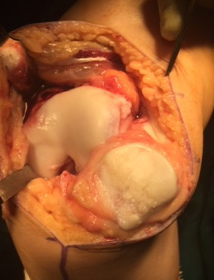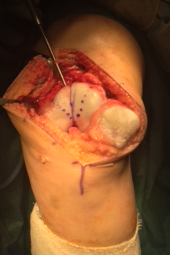Trauma & Orthopaedic
Patient specific trochleoplasty for patellofemoral instability
A Aframian, S Clarke, F Iranpour, D Tennent, JP Cobb, AA Amis, CB Hing
Dislocating kneecaps affect 43/100,000 of the population with recurrence in 40% resulting in pain, inability to work or participate in sports. Current surgery at St George’s Hospital involves opening up the knee joint to refashion the trochlear groove, deepening it to stabilise kneecap movement.
We aim to develop novel scanning and patellar tracking tools with computer software to deliver tailored surgery specific to the unique anatomy of each patient. This will allow more accurate surgery specific to the patient’s anatomy through a smaller incision. Grants from Orthopaedic Research UK (ORUK) have enabled the project to start and we are looking for patients with an unstable or dislocating kneecap to take part in this research.
Figure 1a: Photograph of a shallow groove resulting in an unstable kneecap with cartilage damage

Figure 1b: Photograph of a trochleoplasty to deepen the groove

Why are knee replacements painful?
A Aframian, F Iranpour, E Auvinet, D Tennent, J Cobb, A Amis, CB Hing
St George’s Hospital & Imperial College London
Knee arthritis is routinely treated with a knee replacement. About 20% of patients are unhappy with their knee replacement due to pain. The most common reason for this is due to problems relating to how the kneecap moves with the knee replacement causing pain in 12/100 patients per year. This has been shown to be a major cause of further revision surgery. Improving the way the kneecap moves will therefore reduce pain in a significant proportion of knee replacement patients, prevent further surgery and save the NHS money.
Currently the surgeon uses their own experience to determine what is the best position and size of implants used during the surgery to reproduce normal kneecap tracking. With the help of an endowment from St George’s Hospital Charity we have established a collaborative research group between St George’s University London and Imperial College London investigating kneecap tracking and developing a customised three-dimensional computer guided system to track the movements of the kneecap during surgery. We are looking for patients with pain or an unstable kneecap to take part in this research.


